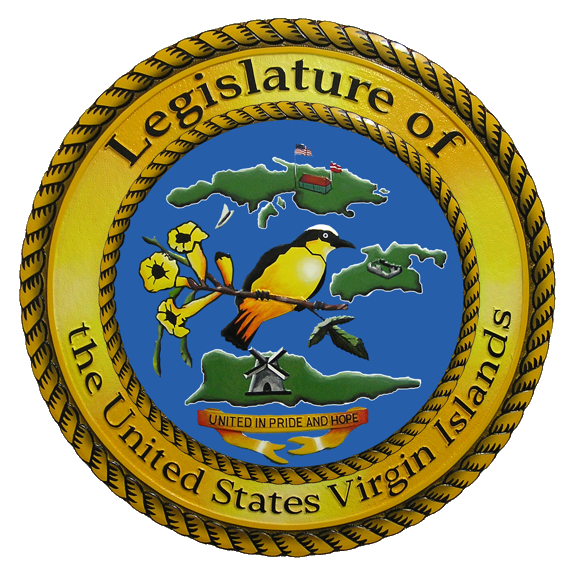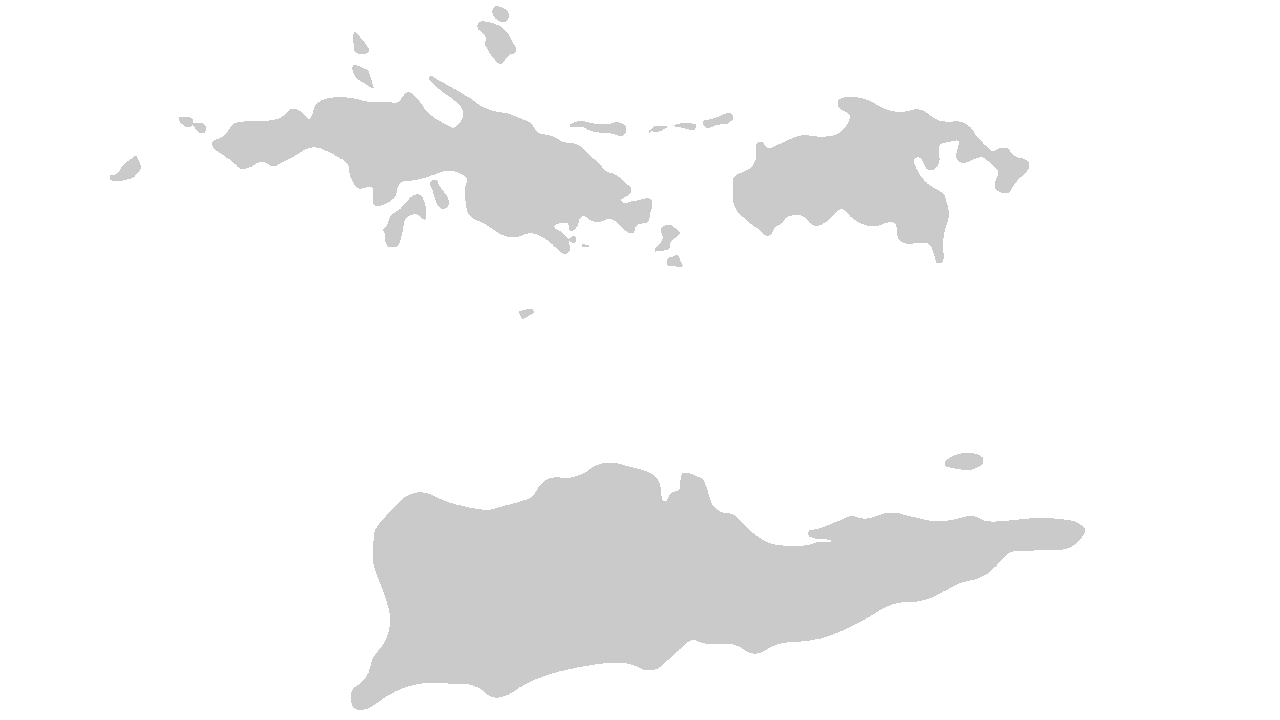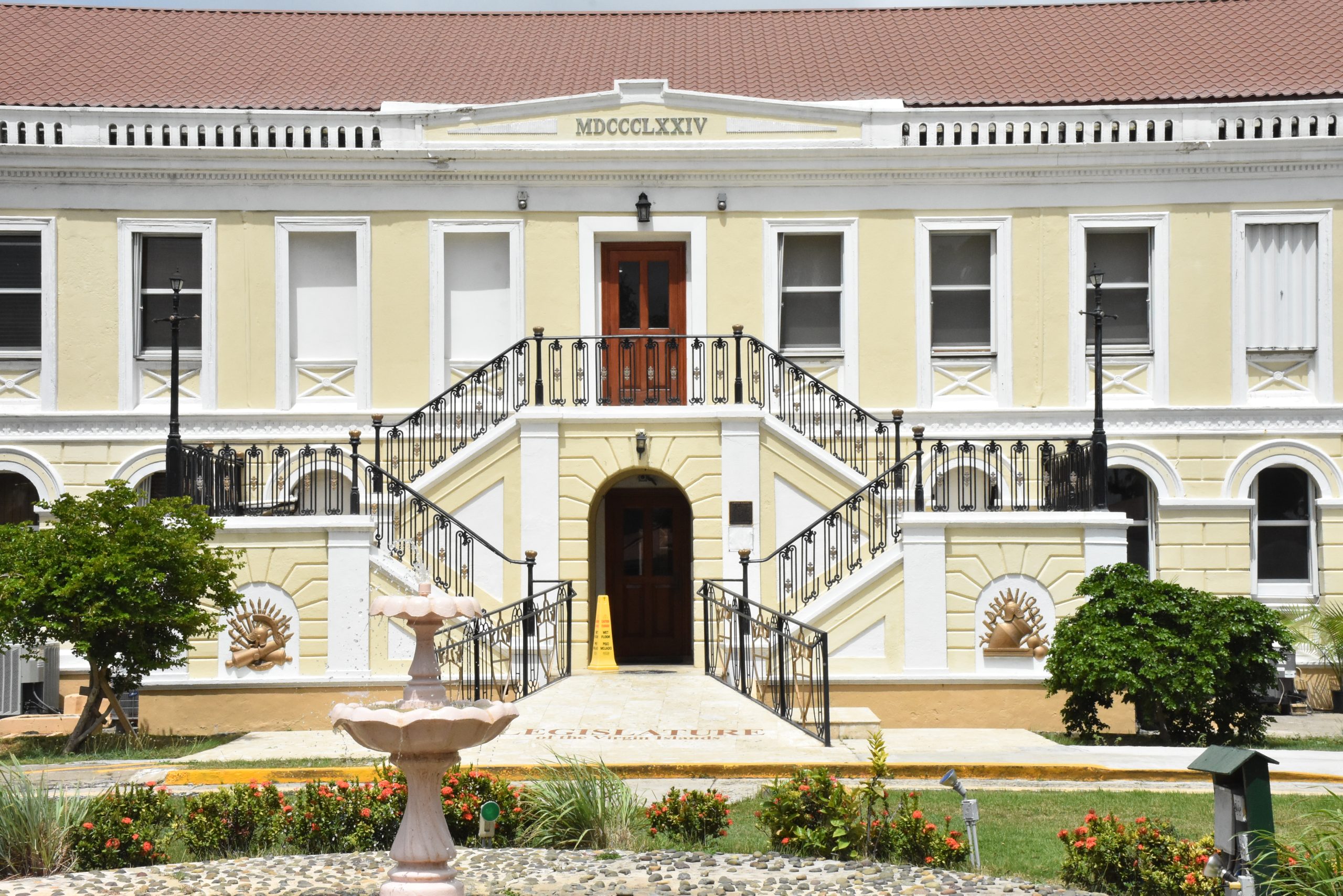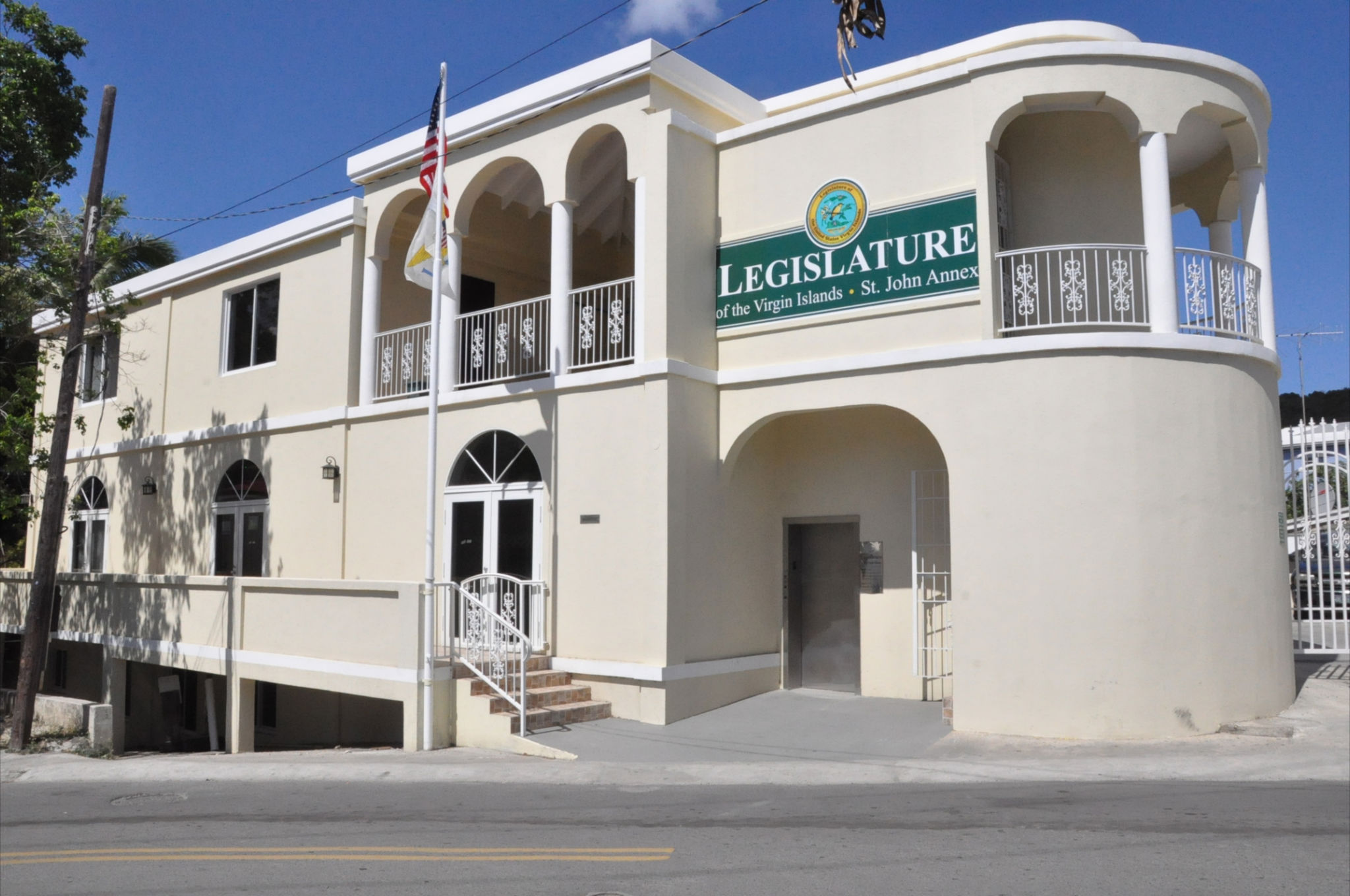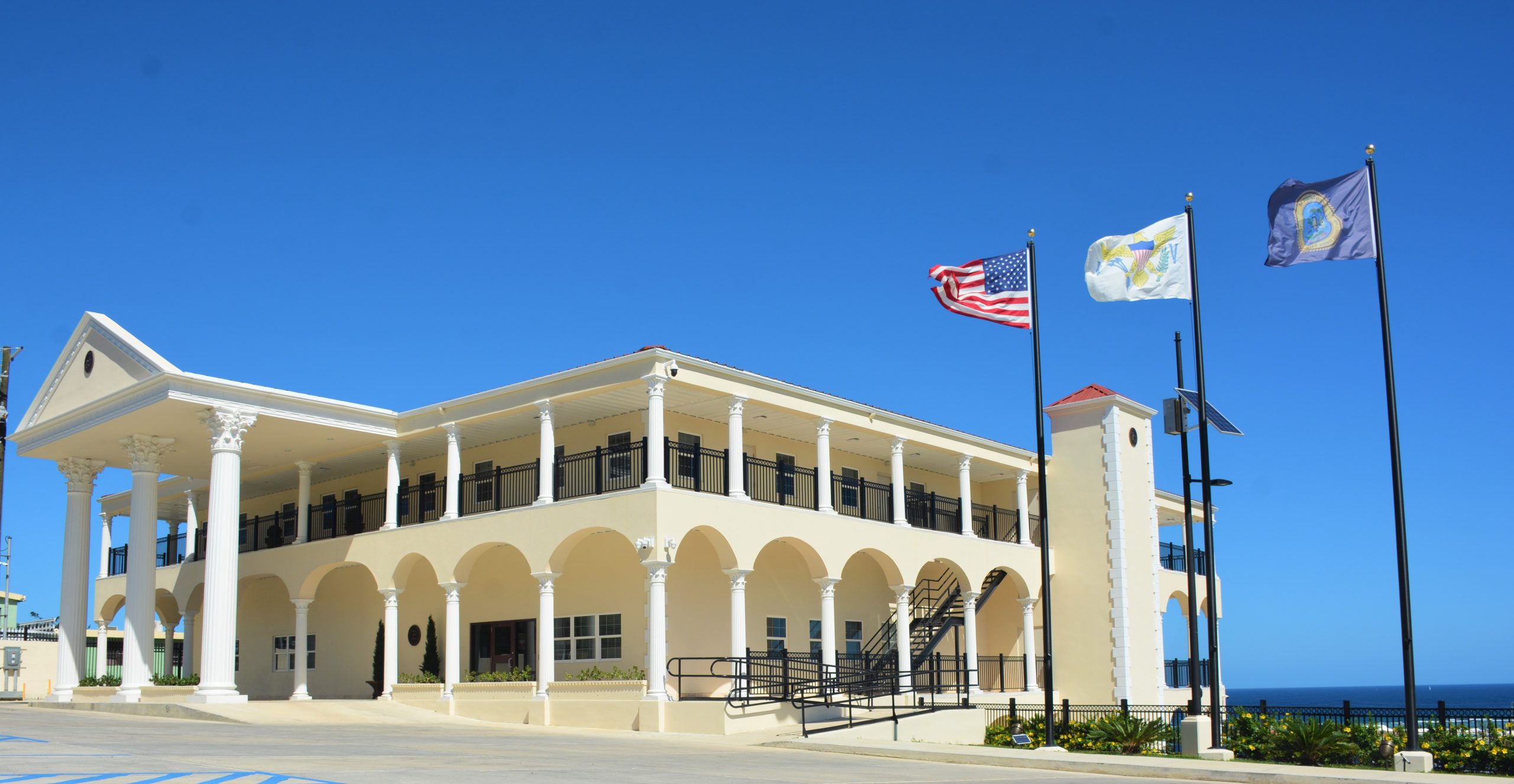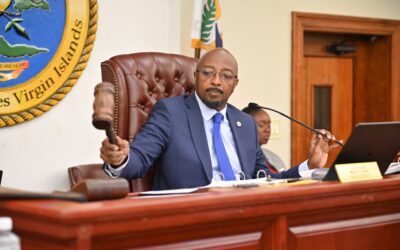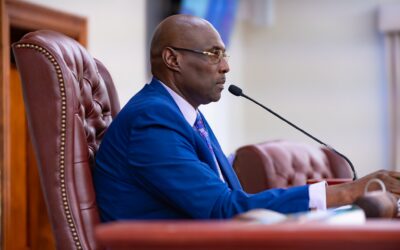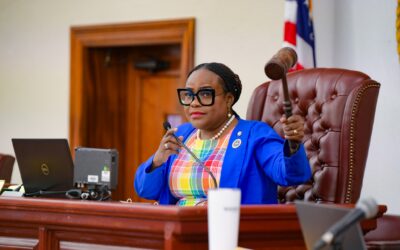ST. CROIX – The Committee on Education and Workforce Development, chaired by Senator Marise C. James convened in a meeting at the Frits E. Lawaetz Legislative Conference Room. Lawmakers received an update regarding the status of various workforce development initiatives in the territory. Additionally, the Committee received an update concerning the general status of schools in the territory, particularly those on St. Croix, as well as an update concerning the issues that the United Steel Workers have had with the Government of the Virgin Islands.
In Block 1, The Committee received testimony from the Virgin Islands Department of Labor, the Virgin Islands State Workforce Development Board, the Virgin Islands Career and Technical Education Board, Career Technical and Adult Education, UVI Cell, UVI RT Park Vista+, and My Brothers Workshop, specially concerning their roles in workforce development programs and its services that are intended to help people find, prepare for, and maintain employment.
Gary Molloy, Commissioner of the Virgin Islands Department of Labor gave testimony. The Virgin Islands State Workforce Development Board (VISWDB) determines the target industries in the Territory. The Department builds the territory’s pipeline through workforce development programs that focus on target industries, funded through a combination of local and federal funds. To clarify the roles of the Workforce Development Board, VIDOL, Equus Workforce Solutions (EQUUS), American Job Center (AJC) and the One Stop Services from partners, the Workforce Innovation and Opportunity Act (WIOA) of 2014 federal legislation reinforce the role of local workforce boards in workforce Development system. WIOA placed a major focus on industry led partnerships and sector specific partnerships to make sure that training programs were aligned with employee needs. The Skills for Today Program has presented itself as a major resource for Virgin Islanders over the last two years. It has delivered essential training and certifications, which has played a crucial role in the territory’s recovery, development, and transformation. It has offered opportunities for many to participate in areas such as welding, plumbing, electrical work, and supervisory programs, earning NCCER certifications, and OSHA 10 Certification. The program received 1,378 applications. Of these, 961 are actively engaged in the program. Over 70% of participants have successfully completed the rigorous construction skills and core program. According to the Labor Market Information found in the Virgin Islands Electronic Workforce System (VIeWS), during the last 12 months, the leading 11 occupations for employees and job seekers include roles such as waiters/waitresses, customer service representatives, maids/housekeeping cleaners, construction laborers, bartenders, retail salespersons, hotel/motel/resort desk clerks, accountants/auditors, janitors/cleaners (excluding maids/housekeeping cleaners), carpenters, and security guards. Additionally, the Youth and Apprenticeship Division is dedicated to designing and managing workforce development initiatives for those aged 14 to 25. The team conducts in-house academic career assessment to tailor services to the individual. The youth team serves over seven hundred youth in the territory. Molloy reminded the body that the Department of Labor is currently encountering challenges in its collaboration with the RT Park, especially with the VISTA+ program. Molloy stated that the department was actively trying to resolve the issues.
Michael Carty, the Chairman of the Virgin Islands State Workforce Board delivered testimony. Carty stated that the Board was charged with strengthening the workforce Development by building strong partnerships with secondary and post-secondary education, economic development, and the public and private sectors to align and improve economic growth in the Virgin Islands. The Eligible Training Provider (ETP) is a critical component of its service delivery system. The Virgin Islands Workforce Development Board Eligible Training Provider identifies training providers who quality to received workforce Innovative and Opportunity Act funds to train adults, dislocated workers, and out of school youth in the accountability, quality, and labor market. The ETP program provides access to training services that are linked to occupations in demand within the Virgin Islands. It includes providers who offer programs that meet the needs of the workforce. The Board has partnered with Metrix Learning to provide Career Pathways exploration tools, skill assessment, skill gap analysis, and remediation courses free to all Virgin Islanders.
Joanne Murphy, Chairwoman of the VI Career and Technical Education Board delivered additional testimony. Murphy stated that the foundation of the Board’s work rests close with collaboration with the Department of Education, especially with the State Office of Career, Technical, and Adult Education, (SOCTAE), which ensures the proper administration of federal funds, as well as ensuring quality education in the Virgin Islands. There is also a major focus on career readiness in grades nine through twelve, to properly prepare students for the workforce. Murphy stated that these efforts ensure that the programs align with national standards to ensure that students receive the best possible education. The Board is tasked with ensuring that CTE programs are carefully designed to include classroom instruction, mentorship, and national certification components. This approach will allow students to be both job and college ready at the completion of the program. Murphy warned of the ongoing instructor shortage, and proposed a pilot program, which would entail hiring instructors at $30 an hour up to 9 hours a week to provide expert training in fields including the construction trades, diesel mechanics, heavy equipment operation and architecture. These positions are currently not being filled by full-time instructors, due to low salaries. Murphy also implored the body for improved funding, such as the proposed $250,000 Lena Shulterbrandt Fund. Murphy stated that without these funds, CTE Education would risk shifting further into the private sector, eventually being absorbed from public education.
Dr. Suzanne Darrow-Magras, the Director of UVI Cell delivered testimony. Darrow-Magras informed the body that UVI CELL serves a diverse range of customers including the local workforce, community members, government agencies, community organizations and local business, as well as university partners. Ten full time staff members operate between the two UVI campuses, along with four student workers and 10-20 part time adjunct faculty and contracted team members. UVI Cell served 2200 customers in FY 2023. Additionally, Alfonso Rodriquez, the Senior Entrepreneurship Manager at the Virgin Islands Research and Technology Park delivered testimony. Rodriquez stated that the RT Park’s vision was to transform the US Virgin Islands into a hub for technology and agriculture focused development. The RT Park has been encouraging Virgin Islanders of the diaspora in the mainland to return home with its campaign. To date, the Come Home USVI campaign concluded three events with a total of 236 candidates. The VISTA+ team has started to foster community engagement. This has included job fairs on both islands. Additionally, the RT park has produced the VI STEM Kids Program, has served as an approach to provide STEM based learning opportunities to younger children. Rodriquez noted the challenges that exist such as excessive cost of utilities and housing.
Jenny Hawkes, the Executive Director of My Brother’s Workshop delivered testimony. Hawkes stated that MBW has played a vital role in the success of youth by helping young people gain skills that increase their employment chances. Youth enter MBW programs and immediately are placed in simulated work environments to learn endurance, workplace safety, communication skills and a strong work ethic. Youth are at the program an average of 9-12 months and earn stipends while there. With wrap around services available such as mentoring and mental health counseling, the students learn how to interact with supervisors, as well as learning to heal from trauma. If a student enters the program and has not completed a high school diploma, they are required to enroll in an online program that will allow the student to finish their studies.
MBW currently has vocational training on St. Thomas with construction, carpentry, plumbing, electrical, masonry, and marine repair and maintenance at its workshop in Tutu and culinary arts and customer services at the café and bakery downtown Charlotte Amalie and retail experience at its Paradise Point location. On St Croix, the MBW workshop is located in Castle Coakley and focuses on construction and carpentry skills. On St Thomas, MBW is building a main campus behind Home Depot that will increase its capacity from one hundred students a year to the ability to serve over three hundred with Building One which is in construction. Once all the buildings are completed, the capacity could increase up to 800-1,000 annually. Chairperson James voiced concern over the posted unemployment rate in the US Virgin Islands, which officially stood at 3.5%, asking if it was truly representative of job seekers in the territory. Molloy stated that while the number was inclusive of those aged sixteen and older actively looking for work, the Labor participation rate remained low at approximately 49%.
In Block 2, the Committee received testimony from the Virgin Islands Department of Education, and the Board of Education concerning the general status of schools in the territory, concerning school facilities, specifically repairs to St. Croix schools, the status of the Bureau of School Construction and Maintenance, school schedules, matters of concern regarding the teachers and student protest, and any other matters brought up by the Board of Education. The Committee also heard testimony from students on their high school experience, including but not limited to concerns, issues, and challenges they face in attending public high school.
Victor Somme III, Assistant Commissioner of the Virgin Islands Department of Education delivered testimony on behalf of Commissioner Dionne Wells-Hedrington. In delivered testimony as it pertains to the status of schools, it was stated that maintenance will always be a challenge for the current state of facilities because they have aged out. In 2015, the cost of deferred maintenance was $22 Million. In the territory, there are four facilities that are under the age of 40 years old, which is historically, the life cycle of a school, based on research conducted. The Department continues to work with FEMA to receive the needed funding for new and modernized schools, which is expected to cost approximately $4 Billion. It is expected that every school in the territory will be modernized based on the facilities master plan. VIDE is working with the Program Management firms to develop implantation timelines. Approximately $6 Million in permanent projects and more than $186 million are under construction. In September 2023, schools on the island of St. Croix were adversely affected by an intense heatwave. In response to this, school schedules were adjusted affecting the Juanita Gardine PK-8 School, Eulalie Rivera PK-8 School, John H. Woodson Jr. High School, St. Croix Central High School, St. Croix Educational Complex, and the Career & Technical Education Center. These schedule changes took effect on September 25, 2023. The Juanita Gardine School transitioned back to its usual schedule on October 2, 2023 after electrical upgrades were completed that are now able to sustain AC units in each classroom. Various cooling measures were undertaken at Eulalie Rivera, St Croix Central High School, and St. Croix Educational Complex. This included the replacement of ceiling fans with high grade industrial fans, the lowering of ceiling fans, and the replacement of inoperable window winders. Currently, the John H. Woodson Junior High School is closed due to environmental concerns after a pipe burst its “B” Wing. It was later decided that Woodson would share the Central High School Campus in a double session format. The hybrid schedule provides two hours of virtual instruction in the morning, with each class period lasting 40 minutes from 8:00AM to 10:10AM. In the afternoon, students enjoy about 3.5 hours of in person instruction, which class periods extended to 1 hour from 12:40 to 4:00pm.
Maqueda Noorhassan, a parent of a John H. Woodson Jr. High School student delivered testimony. Noorhassan voiced major concern over the health, wellness, and safety of her daughter, students, and the staff at the John H Woodson Jr. High School. Noorhassan voiced numerous issues with the Woodson campus, such as various debris on the campus, exposed steel, no soap in bathrooms, loose tiles in the cafeteria, and leaks throughout the campus. Noorhassan voiced concern about the health and safety of the Central High School. These issues included the temporary entrance and exit plans for the John H Woodson high school students, termites and red ants on the campus, and swampy conditions on the campus, inviting mosquitos. There was also concern over the use of water on the campus with the current lead and contamination on St. Croix. Noorhassan implored the Department of Education to consider a better plan to accommodate students and staff. Various students voiced concern over the status of campus facilities, such as unusable and unsanitary bathrooms and moldy classrooms.
Finally, in Block Three, the Committee received testimony from the United Steelworkers on ongoing issues they have had with the Government of the Virgin Islands, specifically the Office of Collective Bargaining and the Commissioners of Various Government Agencies.
In correspondence read into the record from Chief Negotiator Joss Springette, Esq, she stated that she would not know the operations, discussions, and other interactions between the commissioners intimately enough to testify on them. Springette’s testimony stated that the USW represents at least fifteen agencies in the central government. Additionally, Springette’s testimony mentioned that USW’s Secretary mentioned pending cases, but did not provide the list to Chairperson James’ office. The USW represents employees in the terms and conditions of employment. The cases cover areas such as an employee’s personnel, personal, medical, criminal, and disciplinary history. These cases are confidential, and if the union provided further details on the issues, Springette would risk ethical and civil violations. The executive branch would be exposed to liability for her testimony, and the union might not have to comply with the standards. Springette’s testimony stated that she was disappointed the Union had not contacted her to have the discussions.
Daniel Flippo, the Director of District Nine of USW delivered testimony. Flippo stated that the members of the USW in the Virgin Islands simply wanted the security that a Collective Bargaining Agreement Brings. He stated that the members want to have the ability to plan and to know that if their contract is for three years, they would know what their wages and benefits would be for that period. Flippo stated that those in the union rightfully expect when they negotiate with the government, reach a tentative agreement, and it is ratified, that the government would honor what would be done in the agreement. Flippo stated that there were several examples of this. According to Flippo, the contact with the Virgin Islands Emergency Management expired in September 2022. Although the USW requested to bargain the wage reopener, and the contact, the Office of Collective Bargaining has yet to offer or accept dates for negotiations. Another example of this was the Supervisor Master’s agreement for workers in the Virgin Islands. He stated that OCB has not accepted or proposed alternative dates to meet and bargain. Flippo stated that he believed that the government was addressing grievances in a lazy way, stating that the integrity of its agreed upon procedure was being threatened.
Senators present at today’s Committee meeting included Marise C. James, Donna A. Frett-Gregory, Marvin A. Blyden, Samuel Carrion, Diane T. Capehart, Dwane M. Degraff, Novelle E. Francis, Jr., Kenneth L. Gittens, Javan E. James, Sr., Franklin D. Johnson, and Carla J. Joseph.
